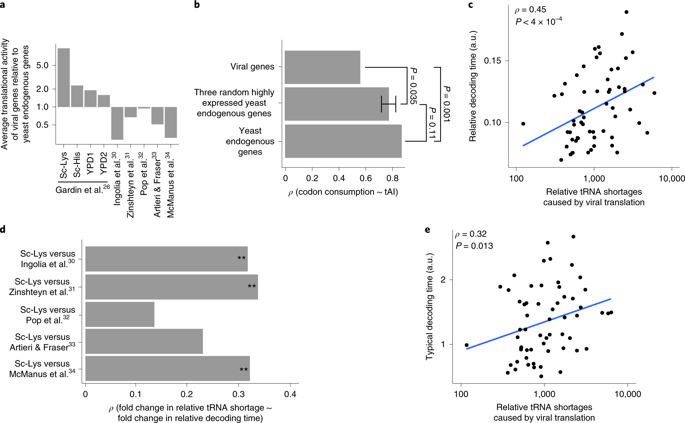Nature Ecology & Evolution ( IF 13.9 ) Pub Date : 2020-03-02 , DOI: 10.1038/s41559-020-1124-7 Feng Chen 1, 2, 3 , Peng Wu 2 , Shuyun Deng 4 , Heng Zhang 5 , Yutong Hou 2 , Zheng Hu 6 , Jianzhi Zhang 7 , Xiaoshu Chen 4, 7 , Jian-Rong Yang 1, 2, 3, 7, 8, 9

|
Eighteen of the 20 amino acids are each encoded by more than one synonymous codon. Due to differential transfer RNA supply within the cell, synonymous codons are not used with equal frequency, a phenomenon termed codon usage bias (CUB). Previous studies have demonstrated that CUB of endogenous genes trans-regulates the translational efficiency of other genes. We hypothesized similar effects for CUB of exogenous genes on host translation, and tested it in the case of viral infection, a common form of naturally occurring exogenous gene translation. We analysed public Ribo-Seq datasets from virus-infected yeast and human cells and showed that virus CUB trans-regulated tRNA availability, and therefore the relative decoding time of codons. Manipulative experiments in yeast using 37 synonymous fluorescent proteins confirmed that an exogenous gene with CUB more similar to that of the host would apply decreased translational load on the host per unit of expression, whereas expression of the exogenous gene was elevated. The combination of these two effects was that exogenous genes with CUB overly similar to that of the host severely impeded host translation. Finally, using a manually curated list of viruses and natural and symptomatic hosts, we found that virus CUB tended to be more similar to that of symptomatic hosts than that of natural hosts, supporting a general deleterious effect of excessive CUB similarity between virus and host. Our work revealed repulsion between virus and host CUBs when they are overly similar, a previously unrecognized complexity in the coevolution of virus and host.
中文翻译:

由于翻译选择,病毒-宿主协同进化中同义密码子使用偏差的异化
20 个氨基酸中的 18 个分别由一个以上的同义密码子编码。由于细胞内不同的转移 RNA 供应,同义密码子的使用频率不同,这种现象称为密码子使用偏差 (CUB)。先前的研究表明,内源基因的 CUB反式调节其他基因的翻译效率。我们假设外源基因的 CUB 对宿主翻译有类似的影响,并在病毒感染的情况下进行了测试,这是一种自然发生的外源基因翻译的常见形式。我们分析了来自病毒感染的酵母和人类细胞的公共 Ribo-Seq 数据集,并显示病毒 CUB反式-调节 tRNA 可用性,因此密码子的相对解码时间。使用 37 种同义荧光蛋白在酵母中进行的操作实验证实,具有与宿主更相似的 CUB 的外源基因将减少宿主每表达单位的翻译负荷,而外源基因的表达升高。这两种效应的结合是具有与宿主过度相似的 CUB 的外源基因严重阻碍了宿主翻译。最后,使用人工整理的病毒和自然宿主和有症状宿主的列表,我们发现病毒 CUB 往往更类似于有症状宿主而不是自然宿主,这支持了病毒和宿主之间过度 CUB 相似性的普遍有害影响。











































 京公网安备 11010802027423号
京公网安备 11010802027423号